PSYC1022 Summer 2020: Cannabis, Dopamine, and Addiction
VerifiedAdded on 2022/08/19
|7
|1894
|12
Essay
AI Summary
This essay, written for a PSYC1022 course, delves into the psychological effects of cannabis, focusing on its impact on the dopamine neurotransmitter system. It explains how cannabis use alters dopamine levels, leading to a cycle of addiction and relapse. The essay examines the role of dopamine in the brain's reward system and how repeated cannabis consumption disrupts this system, contributing to addictive behaviors. It also explores psychological theories related to addiction, including behavioral and cognitive perspectives, to provide a comprehensive understanding of drug dependence. The discussion includes references to scientific journal articles to support the arguments and findings. The essay also explains the changes in the dopamine system resulting from repeated drug use can lead to a cycle of relapse and addiction. It highlights the implications of these effects on mental health and overall well-being, particularly among young users.

Psychology of Addiction
Paraphrase This Document
Need a fresh take? Get an instant paraphrase of this document with our AI Paraphraser
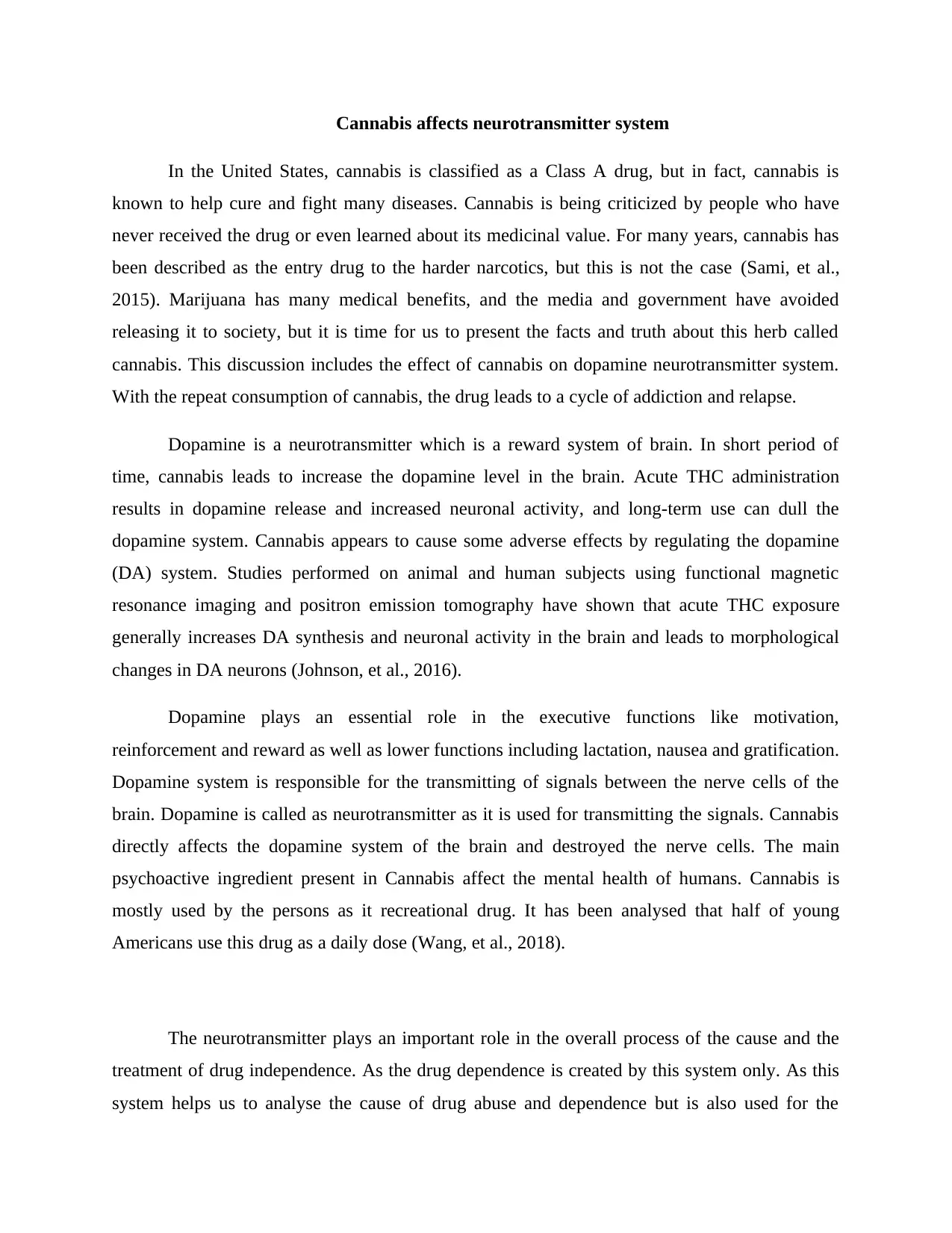
Cannabis affects neurotransmitter system
In the United States, cannabis is classified as a Class A drug, but in fact, cannabis is
known to help cure and fight many diseases. Cannabis is being criticized by people who have
never received the drug or even learned about its medicinal value. For many years, cannabis has
been described as the entry drug to the harder narcotics, but this is not the case (Sami, et al.,
2015). Marijuana has many medical benefits, and the media and government have avoided
releasing it to society, but it is time for us to present the facts and truth about this herb called
cannabis. This discussion includes the effect of cannabis on dopamine neurotransmitter system.
With the repeat consumption of cannabis, the drug leads to a cycle of addiction and relapse.
Dopamine is a neurotransmitter which is a reward system of brain. In short period of
time, cannabis leads to increase the dopamine level in the brain. Acute THC administration
results in dopamine release and increased neuronal activity, and long-term use can dull the
dopamine system. Cannabis appears to cause some adverse effects by regulating the dopamine
(DA) system. Studies performed on animal and human subjects using functional magnetic
resonance imaging and positron emission tomography have shown that acute THC exposure
generally increases DA synthesis and neuronal activity in the brain and leads to morphological
changes in DA neurons (Johnson, et al., 2016).
Dopamine plays an essential role in the executive functions like motivation,
reinforcement and reward as well as lower functions including lactation, nausea and gratification.
Dopamine system is responsible for the transmitting of signals between the nerve cells of the
brain. Dopamine is called as neurotransmitter as it is used for transmitting the signals. Cannabis
directly affects the dopamine system of the brain and destroyed the nerve cells. The main
psychoactive ingredient present in Cannabis affect the mental health of humans. Cannabis is
mostly used by the persons as it recreational drug. It has been analysed that half of young
Americans use this drug as a daily dose (Wang, et al., 2018).
The neurotransmitter plays an important role in the overall process of the cause and the
treatment of drug independence. As the drug dependence is created by this system only. As this
system helps us to analyse the cause of drug abuse and dependence but is also used for the
In the United States, cannabis is classified as a Class A drug, but in fact, cannabis is
known to help cure and fight many diseases. Cannabis is being criticized by people who have
never received the drug or even learned about its medicinal value. For many years, cannabis has
been described as the entry drug to the harder narcotics, but this is not the case (Sami, et al.,
2015). Marijuana has many medical benefits, and the media and government have avoided
releasing it to society, but it is time for us to present the facts and truth about this herb called
cannabis. This discussion includes the effect of cannabis on dopamine neurotransmitter system.
With the repeat consumption of cannabis, the drug leads to a cycle of addiction and relapse.
Dopamine is a neurotransmitter which is a reward system of brain. In short period of
time, cannabis leads to increase the dopamine level in the brain. Acute THC administration
results in dopamine release and increased neuronal activity, and long-term use can dull the
dopamine system. Cannabis appears to cause some adverse effects by regulating the dopamine
(DA) system. Studies performed on animal and human subjects using functional magnetic
resonance imaging and positron emission tomography have shown that acute THC exposure
generally increases DA synthesis and neuronal activity in the brain and leads to morphological
changes in DA neurons (Johnson, et al., 2016).
Dopamine plays an essential role in the executive functions like motivation,
reinforcement and reward as well as lower functions including lactation, nausea and gratification.
Dopamine system is responsible for the transmitting of signals between the nerve cells of the
brain. Dopamine is called as neurotransmitter as it is used for transmitting the signals. Cannabis
directly affects the dopamine system of the brain and destroyed the nerve cells. The main
psychoactive ingredient present in Cannabis affect the mental health of humans. Cannabis is
mostly used by the persons as it recreational drug. It has been analysed that half of young
Americans use this drug as a daily dose (Wang, et al., 2018).
The neurotransmitter plays an important role in the overall process of the cause and the
treatment of drug independence. As the drug dependence is created by this system only. As this
system helps us to analyse the cause of drug abuse and dependence but is also used for the
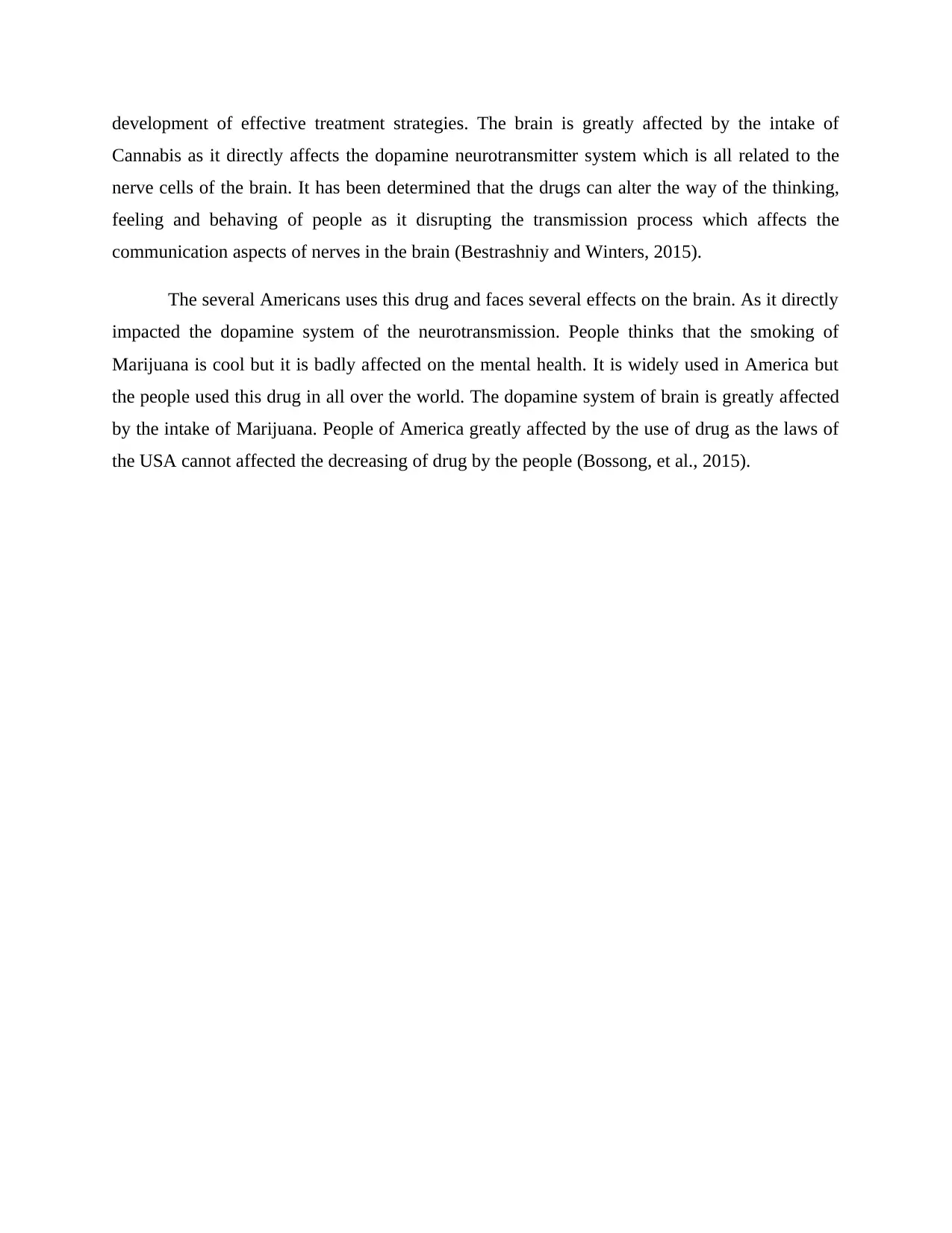
development of effective treatment strategies. The brain is greatly affected by the intake of
Cannabis as it directly affects the dopamine neurotransmitter system which is all related to the
nerve cells of the brain. It has been determined that the drugs can alter the way of the thinking,
feeling and behaving of people as it disrupting the transmission process which affects the
communication aspects of nerves in the brain (Bestrashniy and Winters, 2015).
The several Americans uses this drug and faces several effects on the brain. As it directly
impacted the dopamine system of the neurotransmission. People thinks that the smoking of
Marijuana is cool but it is badly affected on the mental health. It is widely used in America but
the people used this drug in all over the world. The dopamine system of brain is greatly affected
by the intake of Marijuana. People of America greatly affected by the use of drug as the laws of
the USA cannot affected the decreasing of drug by the people (Bossong, et al., 2015).
Cannabis as it directly affects the dopamine neurotransmitter system which is all related to the
nerve cells of the brain. It has been determined that the drugs can alter the way of the thinking,
feeling and behaving of people as it disrupting the transmission process which affects the
communication aspects of nerves in the brain (Bestrashniy and Winters, 2015).
The several Americans uses this drug and faces several effects on the brain. As it directly
impacted the dopamine system of the neurotransmission. People thinks that the smoking of
Marijuana is cool but it is badly affected on the mental health. It is widely used in America but
the people used this drug in all over the world. The dopamine system of brain is greatly affected
by the intake of Marijuana. People of America greatly affected by the use of drug as the laws of
the USA cannot affected the decreasing of drug by the people (Bossong, et al., 2015).
⊘ This is a preview!⊘
Do you want full access?
Subscribe today to unlock all pages.

Trusted by 1+ million students worldwide
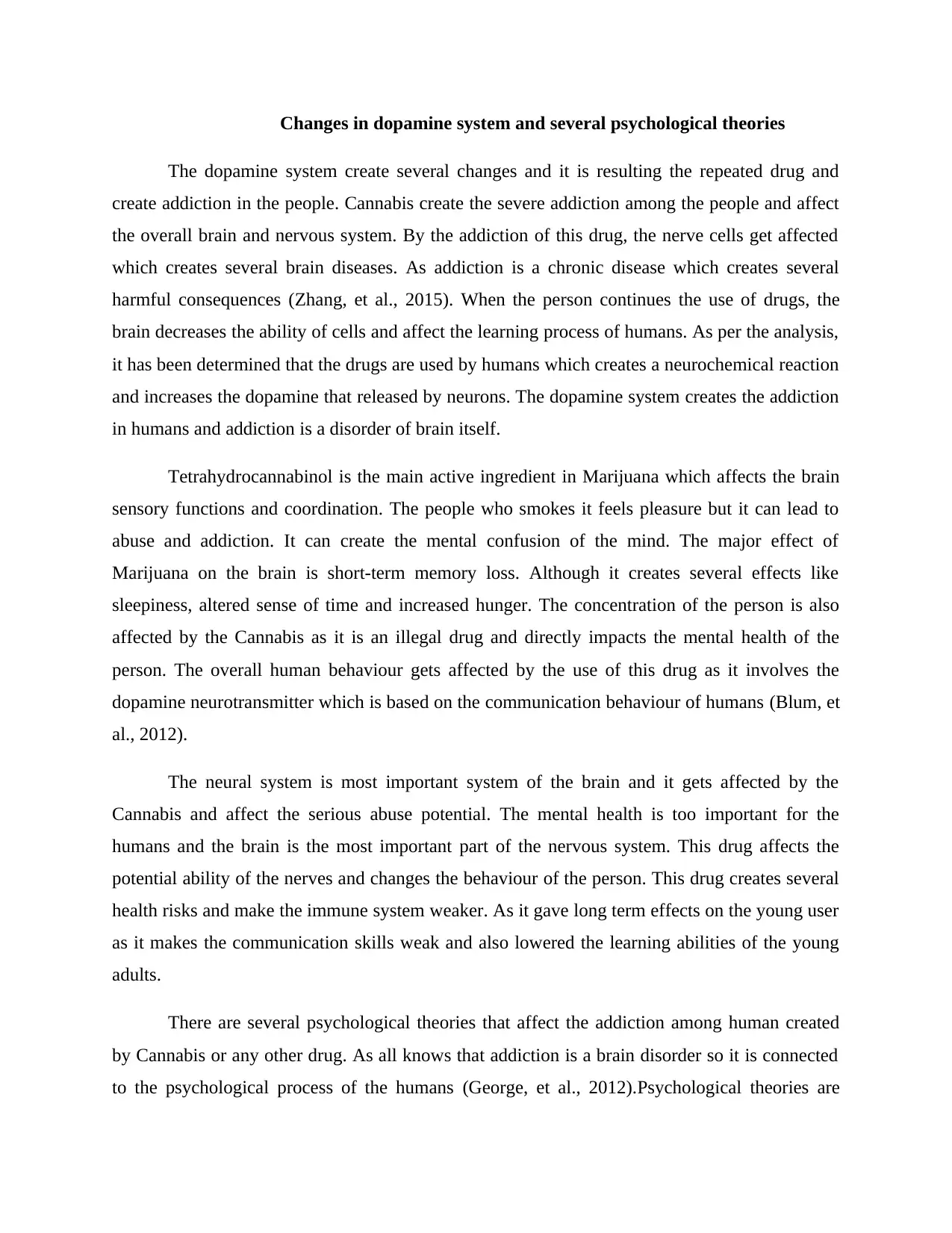
Changes in dopamine system and several psychological theories
The dopamine system create several changes and it is resulting the repeated drug and
create addiction in the people. Cannabis create the severe addiction among the people and affect
the overall brain and nervous system. By the addiction of this drug, the nerve cells get affected
which creates several brain diseases. As addiction is a chronic disease which creates several
harmful consequences (Zhang, et al., 2015). When the person continues the use of drugs, the
brain decreases the ability of cells and affect the learning process of humans. As per the analysis,
it has been determined that the drugs are used by humans which creates a neurochemical reaction
and increases the dopamine that released by neurons. The dopamine system creates the addiction
in humans and addiction is a disorder of brain itself.
Tetrahydrocannabinol is the main active ingredient in Marijuana which affects the brain
sensory functions and coordination. The people who smokes it feels pleasure but it can lead to
abuse and addiction. It can create the mental confusion of the mind. The major effect of
Marijuana on the brain is short-term memory loss. Although it creates several effects like
sleepiness, altered sense of time and increased hunger. The concentration of the person is also
affected by the Cannabis as it is an illegal drug and directly impacts the mental health of the
person. The overall human behaviour gets affected by the use of this drug as it involves the
dopamine neurotransmitter which is based on the communication behaviour of humans (Blum, et
al., 2012).
The neural system is most important system of the brain and it gets affected by the
Cannabis and affect the serious abuse potential. The mental health is too important for the
humans and the brain is the most important part of the nervous system. This drug affects the
potential ability of the nerves and changes the behaviour of the person. This drug creates several
health risks and make the immune system weaker. As it gave long term effects on the young user
as it makes the communication skills weak and also lowered the learning abilities of the young
adults.
There are several psychological theories that affect the addiction among human created
by Cannabis or any other drug. As all knows that addiction is a brain disorder so it is connected
to the psychological process of the humans (George, et al., 2012).Psychological theories are
The dopamine system create several changes and it is resulting the repeated drug and
create addiction in the people. Cannabis create the severe addiction among the people and affect
the overall brain and nervous system. By the addiction of this drug, the nerve cells get affected
which creates several brain diseases. As addiction is a chronic disease which creates several
harmful consequences (Zhang, et al., 2015). When the person continues the use of drugs, the
brain decreases the ability of cells and affect the learning process of humans. As per the analysis,
it has been determined that the drugs are used by humans which creates a neurochemical reaction
and increases the dopamine that released by neurons. The dopamine system creates the addiction
in humans and addiction is a disorder of brain itself.
Tetrahydrocannabinol is the main active ingredient in Marijuana which affects the brain
sensory functions and coordination. The people who smokes it feels pleasure but it can lead to
abuse and addiction. It can create the mental confusion of the mind. The major effect of
Marijuana on the brain is short-term memory loss. Although it creates several effects like
sleepiness, altered sense of time and increased hunger. The concentration of the person is also
affected by the Cannabis as it is an illegal drug and directly impacts the mental health of the
person. The overall human behaviour gets affected by the use of this drug as it involves the
dopamine neurotransmitter which is based on the communication behaviour of humans (Blum, et
al., 2012).
The neural system is most important system of the brain and it gets affected by the
Cannabis and affect the serious abuse potential. The mental health is too important for the
humans and the brain is the most important part of the nervous system. This drug affects the
potential ability of the nerves and changes the behaviour of the person. This drug creates several
health risks and make the immune system weaker. As it gave long term effects on the young user
as it makes the communication skills weak and also lowered the learning abilities of the young
adults.
There are several psychological theories that affect the addiction among human created
by Cannabis or any other drug. As all knows that addiction is a brain disorder so it is connected
to the psychological process of the humans (George, et al., 2012).Psychological theories are
Paraphrase This Document
Need a fresh take? Get an instant paraphrase of this document with our AI Paraphraser
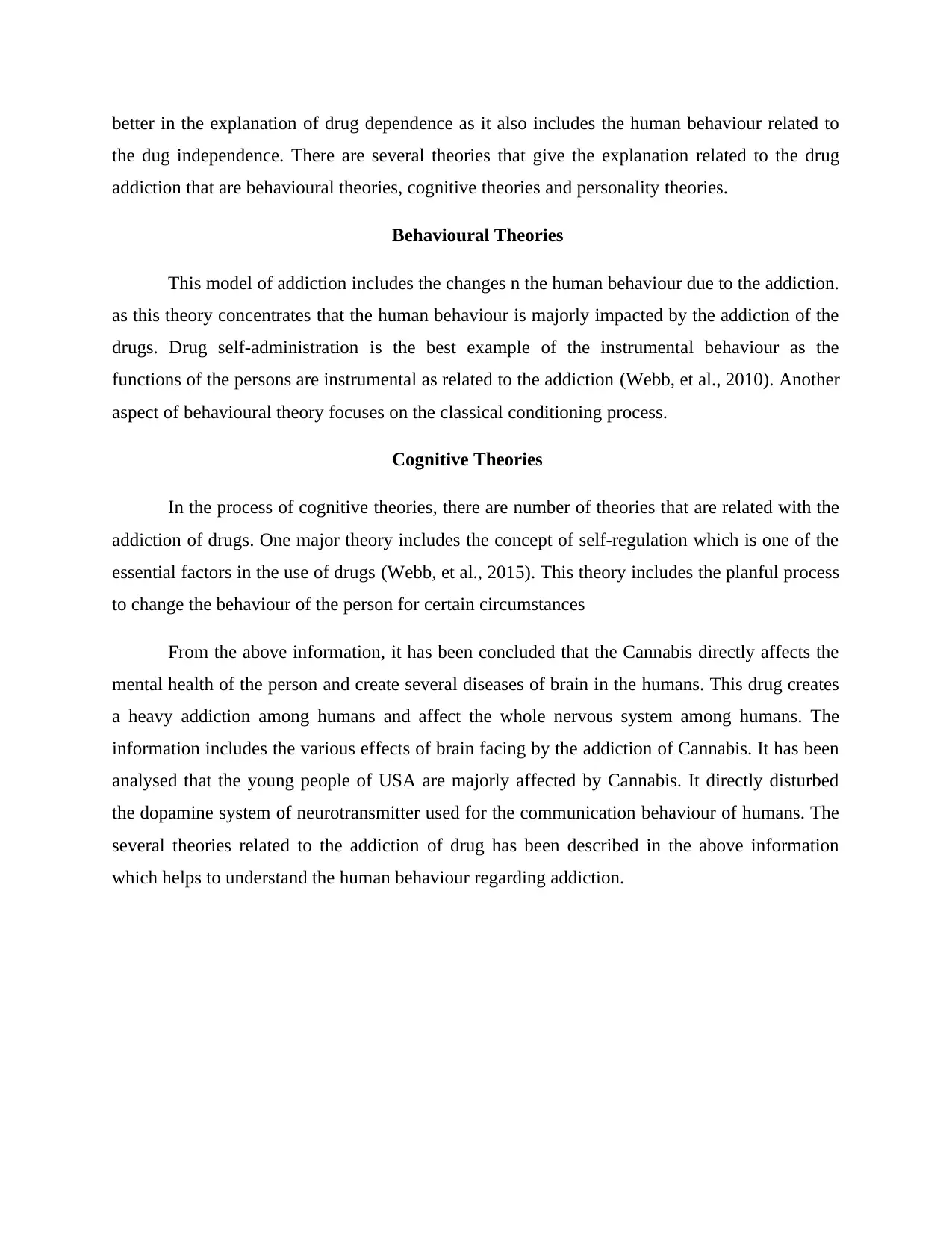
better in the explanation of drug dependence as it also includes the human behaviour related to
the dug independence. There are several theories that give the explanation related to the drug
addiction that are behavioural theories, cognitive theories and personality theories.
Behavioural Theories
This model of addiction includes the changes n the human behaviour due to the addiction.
as this theory concentrates that the human behaviour is majorly impacted by the addiction of the
drugs. Drug self-administration is the best example of the instrumental behaviour as the
functions of the persons are instrumental as related to the addiction (Webb, et al., 2010). Another
aspect of behavioural theory focuses on the classical conditioning process.
Cognitive Theories
In the process of cognitive theories, there are number of theories that are related with the
addiction of drugs. One major theory includes the concept of self-regulation which is one of the
essential factors in the use of drugs (Webb, et al., 2015). This theory includes the planful process
to change the behaviour of the person for certain circumstances
From the above information, it has been concluded that the Cannabis directly affects the
mental health of the person and create several diseases of brain in the humans. This drug creates
a heavy addiction among humans and affect the whole nervous system among humans. The
information includes the various effects of brain facing by the addiction of Cannabis. It has been
analysed that the young people of USA are majorly affected by Cannabis. It directly disturbed
the dopamine system of neurotransmitter used for the communication behaviour of humans. The
several theories related to the addiction of drug has been described in the above information
which helps to understand the human behaviour regarding addiction.
the dug independence. There are several theories that give the explanation related to the drug
addiction that are behavioural theories, cognitive theories and personality theories.
Behavioural Theories
This model of addiction includes the changes n the human behaviour due to the addiction.
as this theory concentrates that the human behaviour is majorly impacted by the addiction of the
drugs. Drug self-administration is the best example of the instrumental behaviour as the
functions of the persons are instrumental as related to the addiction (Webb, et al., 2010). Another
aspect of behavioural theory focuses on the classical conditioning process.
Cognitive Theories
In the process of cognitive theories, there are number of theories that are related with the
addiction of drugs. One major theory includes the concept of self-regulation which is one of the
essential factors in the use of drugs (Webb, et al., 2015). This theory includes the planful process
to change the behaviour of the person for certain circumstances
From the above information, it has been concluded that the Cannabis directly affects the
mental health of the person and create several diseases of brain in the humans. This drug creates
a heavy addiction among humans and affect the whole nervous system among humans. The
information includes the various effects of brain facing by the addiction of Cannabis. It has been
analysed that the young people of USA are majorly affected by Cannabis. It directly disturbed
the dopamine system of neurotransmitter used for the communication behaviour of humans. The
several theories related to the addiction of drug has been described in the above information
which helps to understand the human behaviour regarding addiction.
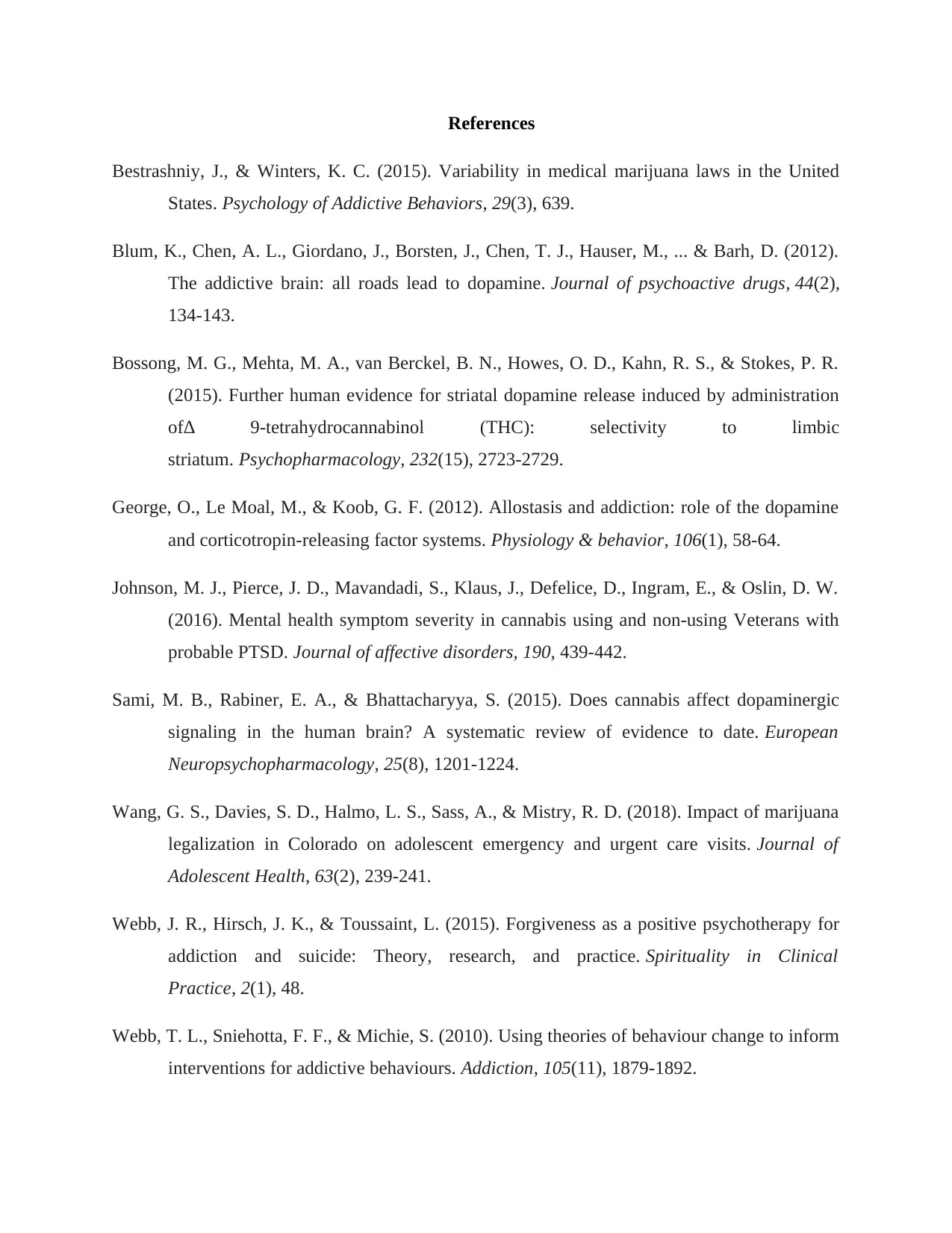
References
Bestrashniy, J., & Winters, K. C. (2015). Variability in medical marijuana laws in the United
States. Psychology of Addictive Behaviors, 29(3), 639.
Blum, K., Chen, A. L., Giordano, J., Borsten, J., Chen, T. J., Hauser, M., ... & Barh, D. (2012).
The addictive brain: all roads lead to dopamine. Journal of psychoactive drugs, 44(2),
134-143.
Bossong, M. G., Mehta, M. A., van Berckel, B. N., Howes, O. D., Kahn, R. S., & Stokes, P. R.
(2015). Further human evidence for striatal dopamine release induced by administration
of∆ 9-tetrahydrocannabinol (THC): selectivity to limbic
striatum. Psychopharmacology, 232(15), 2723-2729.
George, O., Le Moal, M., & Koob, G. F. (2012). Allostasis and addiction: role of the dopamine
and corticotropin-releasing factor systems. Physiology & behavior, 106(1), 58-64.
Johnson, M. J., Pierce, J. D., Mavandadi, S., Klaus, J., Defelice, D., Ingram, E., & Oslin, D. W.
(2016). Mental health symptom severity in cannabis using and non-using Veterans with
probable PTSD. Journal of affective disorders, 190, 439-442.
Sami, M. B., Rabiner, E. A., & Bhattacharyya, S. (2015). Does cannabis affect dopaminergic
signaling in the human brain? A systematic review of evidence to date. European
Neuropsychopharmacology, 25(8), 1201-1224.
Wang, G. S., Davies, S. D., Halmo, L. S., Sass, A., & Mistry, R. D. (2018). Impact of marijuana
legalization in Colorado on adolescent emergency and urgent care visits. Journal of
Adolescent Health, 63(2), 239-241.
Webb, J. R., Hirsch, J. K., & Toussaint, L. (2015). Forgiveness as a positive psychotherapy for
addiction and suicide: Theory, research, and practice. Spirituality in Clinical
Practice, 2(1), 48.
Webb, T. L., Sniehotta, F. F., & Michie, S. (2010). Using theories of behaviour change to inform
interventions for addictive behaviours. Addiction, 105(11), 1879-1892.
Bestrashniy, J., & Winters, K. C. (2015). Variability in medical marijuana laws in the United
States. Psychology of Addictive Behaviors, 29(3), 639.
Blum, K., Chen, A. L., Giordano, J., Borsten, J., Chen, T. J., Hauser, M., ... & Barh, D. (2012).
The addictive brain: all roads lead to dopamine. Journal of psychoactive drugs, 44(2),
134-143.
Bossong, M. G., Mehta, M. A., van Berckel, B. N., Howes, O. D., Kahn, R. S., & Stokes, P. R.
(2015). Further human evidence for striatal dopamine release induced by administration
of∆ 9-tetrahydrocannabinol (THC): selectivity to limbic
striatum. Psychopharmacology, 232(15), 2723-2729.
George, O., Le Moal, M., & Koob, G. F. (2012). Allostasis and addiction: role of the dopamine
and corticotropin-releasing factor systems. Physiology & behavior, 106(1), 58-64.
Johnson, M. J., Pierce, J. D., Mavandadi, S., Klaus, J., Defelice, D., Ingram, E., & Oslin, D. W.
(2016). Mental health symptom severity in cannabis using and non-using Veterans with
probable PTSD. Journal of affective disorders, 190, 439-442.
Sami, M. B., Rabiner, E. A., & Bhattacharyya, S. (2015). Does cannabis affect dopaminergic
signaling in the human brain? A systematic review of evidence to date. European
Neuropsychopharmacology, 25(8), 1201-1224.
Wang, G. S., Davies, S. D., Halmo, L. S., Sass, A., & Mistry, R. D. (2018). Impact of marijuana
legalization in Colorado on adolescent emergency and urgent care visits. Journal of
Adolescent Health, 63(2), 239-241.
Webb, J. R., Hirsch, J. K., & Toussaint, L. (2015). Forgiveness as a positive psychotherapy for
addiction and suicide: Theory, research, and practice. Spirituality in Clinical
Practice, 2(1), 48.
Webb, T. L., Sniehotta, F. F., & Michie, S. (2010). Using theories of behaviour change to inform
interventions for addictive behaviours. Addiction, 105(11), 1879-1892.
⊘ This is a preview!⊘
Do you want full access?
Subscribe today to unlock all pages.

Trusted by 1+ million students worldwide

Zhang, X., Chen, X., Kai, S., Wang, H. Y., Yang, J., Wu, F. G., & Chen, Z. (2015). Highly
sensitive and selective detection of dopamine using one-pot synthesized highly
photoluminescent silicon nanoparticles. Analytical chemistry, 87(6), 3360-3365.
sensitive and selective detection of dopamine using one-pot synthesized highly
photoluminescent silicon nanoparticles. Analytical chemistry, 87(6), 3360-3365.
1 out of 7
Related Documents
Your All-in-One AI-Powered Toolkit for Academic Success.
+13062052269
info@desklib.com
Available 24*7 on WhatsApp / Email
![[object Object]](/_next/static/media/star-bottom.7253800d.svg)
Unlock your academic potential
Copyright © 2020–2025 A2Z Services. All Rights Reserved. Developed and managed by ZUCOL.





